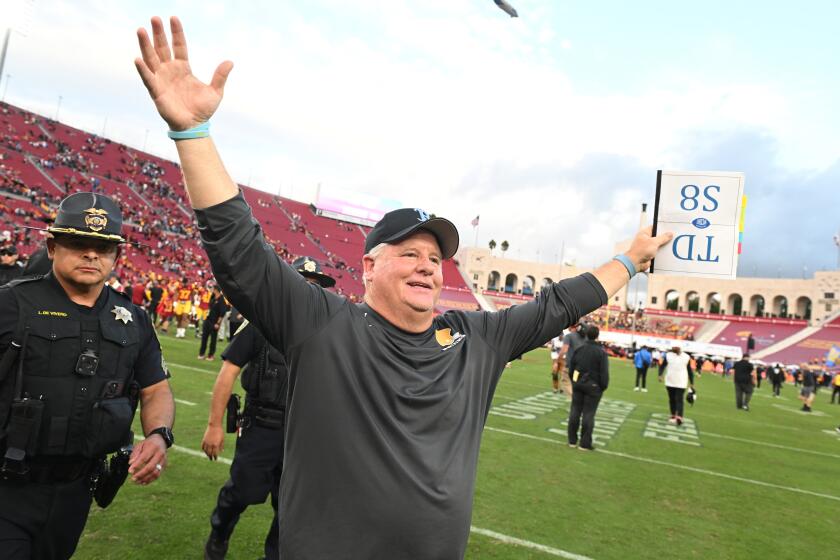Cottons Seek Ruling Reversal
- Share via
Schea Cotton, the would-be UCLA basketball recruit, and his family have sent a letter requesting that the NCAA immediately reverse its decision to declare him academically ineligible, their attorney said Friday.
According to a statement issued by the attorney, Stuart M. Rice, Cotton “had been properly accredited” when he received special accommodations for taking the Scholastic Assessment Test on June 11 and therefore should not have had his qualifying test score thrown out by the NCAA.
The NCAA Clearinghouse ruled Sept. 19 that Cotton should not have received the special accommodations--extra time and bigger type on the questionnaires--because he had not proved he had a learning disorder. The Cottons say their son suffers from anxiety when he takes tests.
The ruling that Cotton is ineligible also means that his acceptance to UCLA was withdrawn, since it was granted on the condition he meets academic requirements.
Cotton decided against formally appealing the Clearinghouse’s decision, Rice said, because that might imply tacit acknowledgment that the NCAA has a case.
“Schea has valid SAT scores,” Rice said Friday afternoon. “He was accredited by ETS [Educational Testing Service, which administers the SAT], and the NCAA action has no lawful authority.”
Without a formal appeal, however, Cotton will be unable to enroll at UCLA, although he can attend classes in an unofficial capacity.
Rice said the letter seeks an apology from the NCAA for what he termed “irreparable harm and continuing damages” that the Cotton family has suffered as a result of a summer-long investigation into the financing of the Ford Explorer that Schea currently is driving and the family’s relationship with Pat Barrett, a local youth-league basketball coach and Nike representative.
The investigation was “unfounded and unlawful” Rice said.
UCLA has said it will support the Cottons should they file a formal appeal.
Both the ETS and the NCAA require students who claim to have a learning disability to provide documentation from a doctor or licensed evaluator.
According to ETS publications, the documentation should include a description of the student’s limitations, results of tests and techniques used to arrive at the diagnosis and a record of special accommodations the student has received in the past.
The NCAA also requires students seeking special accommodations to have a diagnosed learning disability, according to Bob Oliver, an assistant director for the NCAA.
Oliver said Cotton’s case is not unprecedented. “I can’t tell you how many there have been,” Oliver said, “but it happens.”
Rice said Cotton was evaluated by officials at Bellflower St. John Bosco High just before taking the test, but acknowledged that Cotton has no history of receiving accommodations for taking tests at his high school.
More to Read
Go beyond the scoreboard
Get the latest on L.A.'s teams in the daily Sports Report newsletter.
You may occasionally receive promotional content from the Los Angeles Times.






